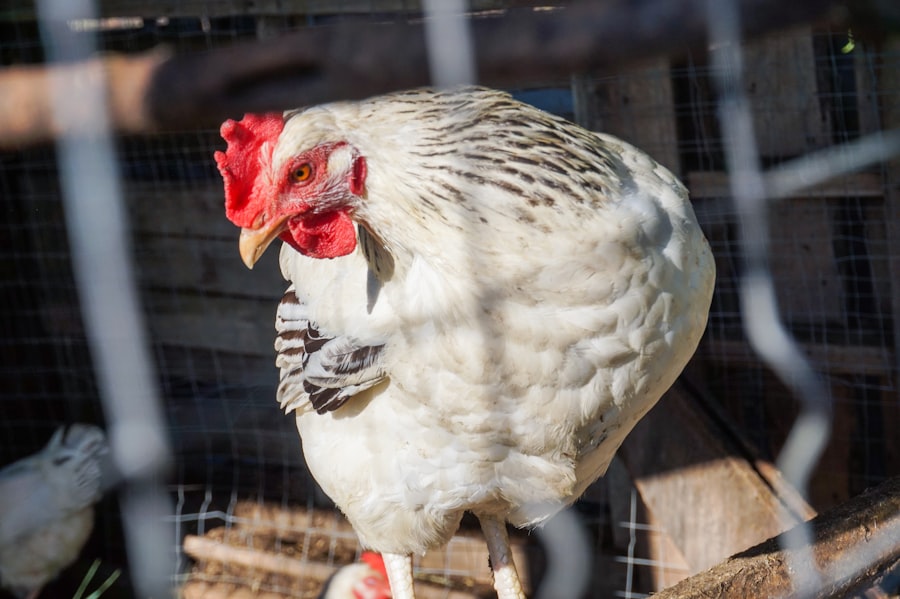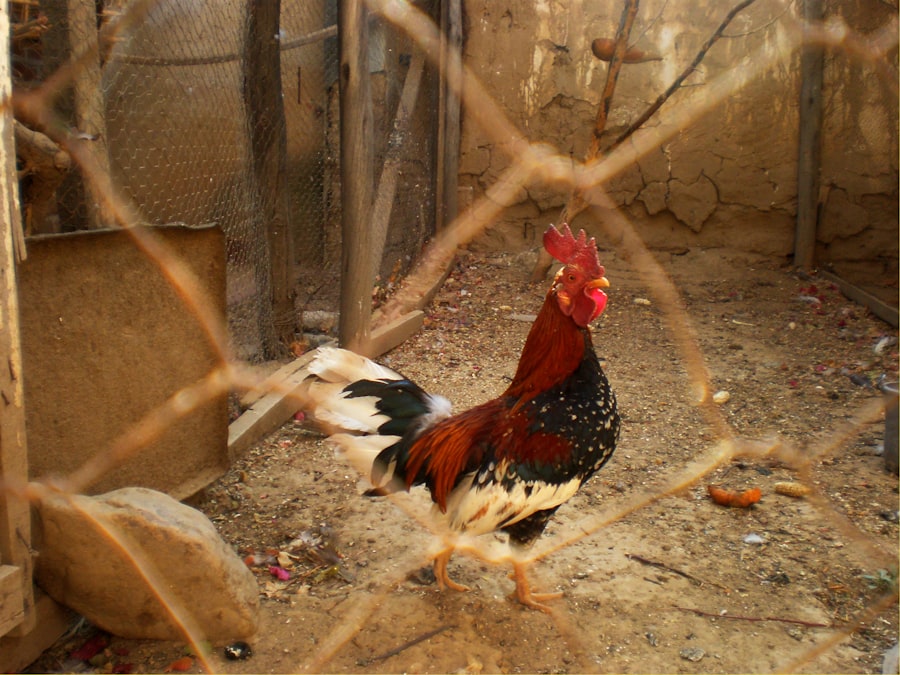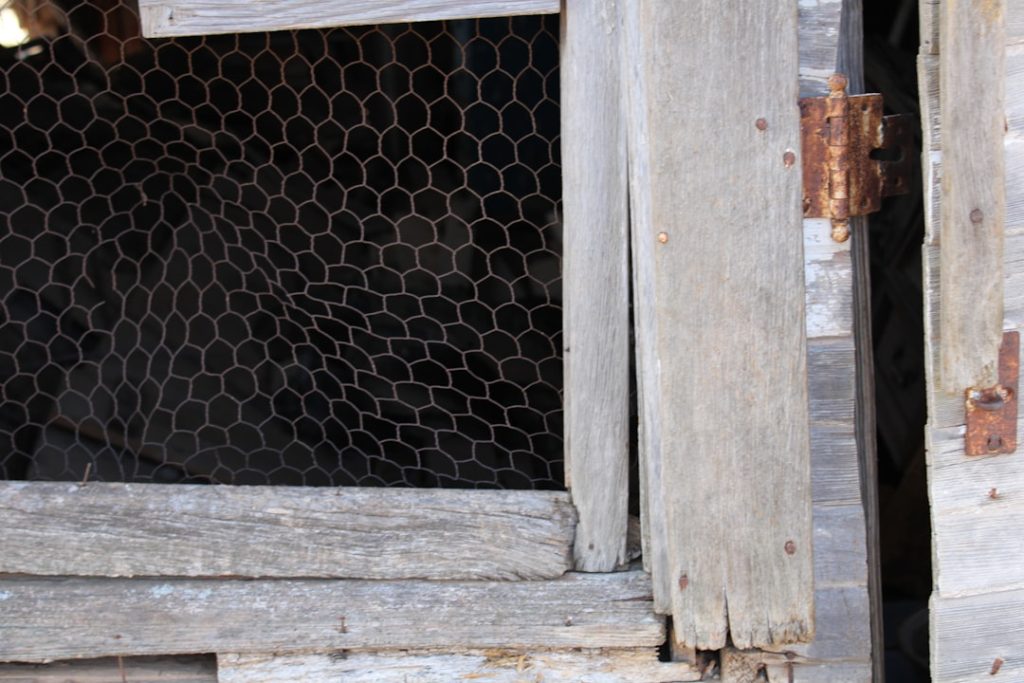Chickens are social, inquisitive animals with strong foraging instincts. They constantly search for insects, seeds, and other food sources, which can motivate them to escape enclosures. Chickens possess the ability to fly short distances, enabling them to clear low fences.
Their natural scratching and digging behaviors may lead to attempts at tunneling under barriers. Chickens typically follow consistent daily routines, including preferred paths for activities like dust bathing and roosting. This habitual behavior often results in repeated testing of enclosure boundaries at specific locations.
Identifying these potential escape routes through observation is crucial for effective fence construction and reinforcement. Understanding chicken behavior is essential for designing and building fences that successfully contain and protect these birds. By considering their natural instincts, physical capabilities, and daily patterns, chicken owners can create more secure enclosures tailored to their flock’s specific needs and tendencies.
Table of Contents
- 1 Choosing the Right Fence Height
- 2 Materials for Building a Chicken-Proof Fence
- 3 Installing the Fence Properly
- 4 Maintaining the Fence
- 5 Additional Strategies for Keeping Chickens Out
- 6 Conclusion and Final Tips
- 7 FAQs
- 7.1 What height should a fence be to keep chickens out of the garden?
- 7.2 What type of fence is best for keeping chickens out of the garden?
- 7.3 Are there any other methods to keep chickens out of the garden besides a fence?
- 7.4 Can chickens fly over a 6-foot fence?
- 7.5 How can I ensure that the fence is secure and effective in keeping chickens out of the garden?
Key Takeaways
- Chickens are naturally curious and will explore their surroundings, so understanding their behavior is crucial for building an effective fence.
- The right fence height is important for keeping chickens in and predators out, with a recommended height of at least 6 feet.
- When choosing materials for a chicken-proof fence, consider durability, visibility, and the ability to withstand pecking and scratching.
- Proper installation of the fence, including burying the bottom to prevent digging and securing it tightly, is essential for its effectiveness.
- Regular maintenance of the fence, including checking for damage and reinforcing weak spots, is necessary to ensure its long-term functionality.
- Additional strategies such as using deterrents and creating barriers can further help in keeping chickens out of unwanted areas.
- Understanding chicken behavior, choosing the right fence height and materials, proper installation, regular maintenance, and additional strategies are all important for effectively keeping chickens out.
Choosing the Right Fence Height
Breed and Flying Ability
The breed of chickens you have is a significant factor in determining the fence height. Some breeds are better flyers than others, so if you have breeds known for their flying abilities, you will need a taller fence to keep them contained.
Predators and Regional Considerations
Another crucial factor is the predators in your area. If you have a lot of ground predators such as foxes or raccoons, you will need a taller fence to keep them out and protect your chickens. It’s essential to research the typical predators in your region and build a fence that will effectively deter them.
Terrain and Landscape
The terrain of your property is also an important consideration. If you have a sloped or uneven landscape, you may need a taller fence in some areas to ensure that your chickens cannot easily escape.
Overall, choosing the right fence height is crucial for keeping your chickens safe and secure in their enclosure.
Materials for Building a Chicken-Proof Fence

When it comes to building a chicken-proof fence, there are several materials that are commonly used for their durability and effectiveness. One popular option is welded wire fencing, which is made of sturdy metal wire that is welded together to create a strong and secure barrier. This type of fencing is ideal for keeping predators out and chickens in, as it is difficult for them to break or bend the wire.
Another option is hardware cloth, which is similar to welded wire fencing but has smaller openings, making it even more secure against predators and escape attempts. Wood fencing is another common choice for chicken enclosures, as it provides a solid barrier that is difficult for chickens to break through. However, it’s important to use treated or rot-resistant wood to ensure that the fence will last for many years without deteriorating.
Electric fencing is also an effective option for keeping chickens contained, as it delivers a mild shock to deter them from attempting to escape. Additionally, using sturdy fence posts and strong fasteners such as screws or heavy-duty staples will help ensure that your fence remains secure and intact over time. Overall, choosing the right materials for building a chicken-proof fence is essential for creating a durable and effective enclosure for your flock.
Installing the Fence Properly
Proper installation of a chicken-proof fence is crucial for ensuring its effectiveness and longevity. The first step in installing a fence is to carefully plan out the layout and design of the enclosure. Take into consideration the size of your flock, the terrain of your property, and any potential escape routes that need to be addressed.
Once you have a clear plan in place, it’s important to properly mark out the perimeter of the enclosure and ensure that it is level and straight. When it comes to installing the actual fencing material, it’s important to securely attach it to sturdy fence posts using appropriate fasteners such as screws or heavy-duty staples. This will help prevent the fence from sagging or becoming loose over time.
Additionally, be sure to bury the bottom of the fence at least 6 inches into the ground to prevent chickens from digging underneath it. If you are using electric fencing, follow the manufacturer’s instructions carefully to ensure that it is installed correctly and safely. Finally, regularly inspect the fence after installation to check for any weak spots or areas that may need reinforcement.
Properly installing a chicken-proof fence is essential for keeping your flock safe and secure within their enclosure.
Maintaining the Fence
Once your chicken-proof fence is installed, regular maintenance is essential for ensuring its effectiveness over time. Inspect the fence regularly for any signs of wear or damage, such as loose wires, broken posts, or areas where chickens may be attempting to dig underneath. Address any issues promptly to prevent them from becoming larger problems that could compromise the security of the enclosure.
Additionally, keep vegetation trimmed around the perimeter of the fence to prevent it from becoming overgrown and providing cover for predators or potential escape routes for your chickens. If you have electric fencing, regularly check the voltage levels and ensure that the wires are not damaged or obstructed in any way. Finally, consider applying a protective coating or sealant to wooden fencing to help prevent rot and deterioration over time.
By staying on top of regular maintenance tasks, you can ensure that your chicken-proof fence remains strong and secure for years to come.
Additional Strategies for Keeping Chickens Out

Providing Enrichment and Entertainment
In addition to building a secure chicken-proof fence, providing plenty of enrichment and entertainment within their enclosure can reduce your chickens’ desire to escape in search of stimulation. This can be achieved by hanging treats or toys for them to peck at, creating dust bathing areas, or providing perches and climbing structures for them to explore.
Using Natural Deterrents and Security Measures
Another effective strategy is to use natural deterrents such as planting thorny bushes or shrubs around the perimeter of the enclosure to discourage predators from approaching and deter chickens from attempting to escape. Additionally, consider using motion-activated sprinklers or sound devices near the fence line to startle predators and deter them from approaching.
Preventing Flight and Additional Security Measures
Finally, consider using netting or wire covers over the top of the enclosure to prevent chickens from flying over the fence. By implementing these additional strategies in conjunction with a secure chicken-proof fence, you can create a safe and secure environment for your flock.
Conclusion and Final Tips
In conclusion, understanding the behavior of chickens is crucial for building an effective chicken-proof fence that will keep them contained and safe within their enclosure. By choosing the right materials and installing the fence properly, you can create a durable barrier that will withstand escape attempts and protect your flock from predators. Regular maintenance and additional strategies such as providing enrichment and natural deterrents will further enhance the security of your chicken enclosure.
In addition to these tips, it’s important to regularly monitor your chickens’ behavior and make adjustments as needed to address any potential escape routes or security concerns. By taking a proactive approach to keeping your chickens contained, you can create a safe and secure environment for them to thrive. With careful planning and attention to detail, you can build a chicken-proof fence that will provide peace of mind knowing that your flock is protected from harm.
If you’re looking for ways to keep chickens out of your garden, you may also be interested in learning about whether guinea fowl can live with chickens. According to Poultry Wizard, guinea fowl can be a great addition to a flock of chickens and can help keep pests out of the garden.
FAQs
What height should a fence be to keep chickens out of the garden?
The recommended height for a fence to keep chickens out of the garden is at least 6 feet tall. This height is sufficient to prevent most chicken breeds from flying or jumping over the fence.
What type of fence is best for keeping chickens out of the garden?
A solid fence, such as a wooden or metal fence, is best for keeping chickens out of the garden. This type of fence provides a physical barrier that is difficult for chickens to breach.
Are there any other methods to keep chickens out of the garden besides a fence?
In addition to a tall fence, other methods to keep chickens out of the garden include using chicken wire or poultry netting to create a barrier around the garden area. Additionally, using deterrents such as motion-activated sprinklers or natural repellents can also help deter chickens from entering the garden.
Can chickens fly over a 6-foot fence?
Most chicken breeds are not able to fly over a 6-foot fence. However, some lighter or more agile breeds may still be able to fly or jump over a fence of this height. It’s important to consider the specific breeds of chickens in the area when determining fence height.
How can I ensure that the fence is secure and effective in keeping chickens out of the garden?
To ensure that the fence is secure and effective, it’s important to regularly inspect the fence for any damage or weak spots. Additionally, reinforcing the bottom of the fence with buried wire or extending the fence underground can help prevent chickens from digging under the fence.
Meet Walter, the feathered-friend fanatic of Florida! Nestled in the sunshine state, Walter struts through life with his feathered companions, clucking his way to happiness. With a coop that’s fancier than a five-star hotel, he’s the Don Juan of the chicken world. When he’s not teaching his hens to do the cha-cha, you’ll find him in a heated debate with his prized rooster, Sir Clucks-a-Lot. Walter’s poultry passion is no yolk; he’s the sunny-side-up guy you never knew you needed in your flock of friends!







